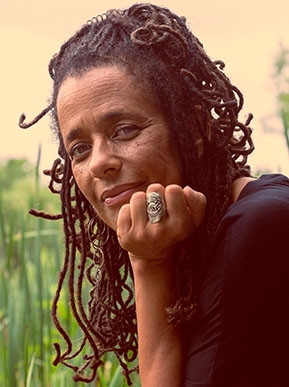Carolyn Finney
she/her
Artist-in-Residence, Environmental Affairs

- Office
- Franklin Env Ctr-Hillcrest 121
- Tel
- (802) 443-2350
- cmfinney@middlebury.edu
- Office Hours
- Tuesday, 1-3pm, or by appointment (in person and virtual)
Carolyn Finney, currently an artist-in-residence in the Franklin Environmental Center at Middlebury College, is a storyteller, author, and cultural geographer. A Fulbright Scholar, a Canon National Parks Science Scholar, and recipient of a Mellon Postdoctoral Fellowship in Environmental Studies, she has served on the U.S. National Parks Advisory Board, and has held positions atWellesley College, the University of California, Berkeley , as well as the University of Kentucky. Along with being the new columnist at Earth Island Journal, she was recently awarded the Alexander and Ilse Melamid Medal from the American Geographical Society.She has published pieces in BESIDE, The Guardian, and the New York Times and has essays forthcoming in the anthologies Nature Swagger: Stories and Visions of Black Joy in the Outdoors (edited by Rue Mapp, November, 2022) and A Darker Wilderness: Black Nature Writing from Soil to Stars (edited by Erin Sharkey). Her first book, Black Faces, White Spaces: Reimagining the Relationship of African Americans to the Great Outdoorswas released in 2014.
Courses Taught
ENVS 0220
Current
The N Word: Nature, Revisited
Course Description
The N Word: Nature, Revisited
What do voices from American History, both past and present, reveal about the way race, and privilege shape how we understand conservation, climate change and environmental justice today? How does your voice matter in this current moment? We will consider the foundations of environmental ideas and attitudes. In particular, in this current climate where Black Lives Matter and systemic racism are central in our conversations about place and space, we will explore the construction of environmental narratives and how race impacts environmental participation. In addition, we will explore how representations of the natural environment are structurally and culturally racialized within environmental institutions and the media by engaging in “conversations” with environmental icons such as John Muir and other historical and contemporary figures such as Zora Neale Hurston and James Baldwin. 3 hrs. sem.
Terms Taught
Requirements
ENVS 0244
Poetics&PracticeClimate Change
Course Description
Poetics and Practice: Engaging Complexity in the Age of Climate Change
Climate change. Race. Technology. Story. In this course, we will engage academia, the arts, and activism to explore the nature of climate change and its impacts, how we show up in this moment, and how “difference” informs our choices. What is our emotional relationship to change and why does that matter? How do we consider different entry points based on experience, identity, and understanding? How do we lean into the complexity (whether talking about identity, technology, or the environment) and move from personal practice to a collective practice? We will explore diverse ideas from artists, activists, writers and thinkers including Ava DuVarney, Robert Sapolsky, and Ayana Elizabeth Johnson through lectures, dialogue, writing and story-making. Come ready to play!
Terms Taught
ENVS 0500
Upcoming
Independent Study
Course Description
Independent Study
In this course, students (non-seniors) carry out an independent research or creative project on a topic pertinent to the relationship between humans and the environment. The project, carried out under the supervision of a faculty member with related expertise who is appointed in or affiliated with the Environmental Studies Program, must involve a significant amount of independent research and analysis. The expectations and any associated final products will be defined in consultation with the faculty advisor. Students may enroll in ENVS 0500 no more than twice for a given project. (Approval only)
Terms Taught
ENVS 0700
Upcoming
Senior Independent Study
Course Description
Senior Independent Study
In this course, seniors complete an independent research or creative project on a topic pertinent to the relationship between humans and the environment. During the term prior to enrolling in ENVS 0700, a student must discuss and agree upon a project topic with a faculty advisor who is appointed in or affiliated with the Environmental Studies Program and submit a brief project proposal to the Director of Environmental Studies for Approval. The expectations and any associated final products will be defined in consultation with the faculty advisor. Students may enroll in ENVS 0700 as a one-term independent study OR up to twice as part of a multi-term project, including as a lead-up to ENVS 0701 (ES Senior Thesis) or ENVS 0703 (ES Senior Integrated Thesis). (Senior standing; Approval only)
Terms Taught

